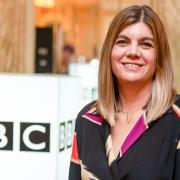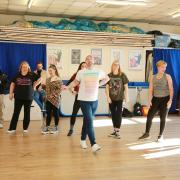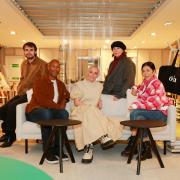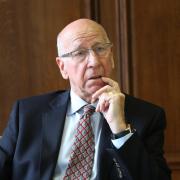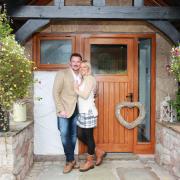Wilmslow-based TV medic Dr Rangan Chatterjee reveals why he is on a mission to make us the architects of our own health
To millions of viewers Dr Rangan Chatterjee is the youthful TV medic who dispenses advice via the BBC One’s Breakfast and his Doctor in the House TV series. But to those in Wilmslow he’s their GP - or rather he was until his media career took off.
Alongside the TV work and an award-winning podcast, he has written two books. The first, The 4 Pillar Plan, has sold an astonishing 150,000 copies and his second, The Stress Solution, which is released this month, looks like it may repeat the same success, covering as it does the biggest health topic around, stress.
‘The things I am most proud of in my career are the things I have been doing for the last five years which is what I do in the media,’ admits Rangan, who still occasionally does locum work at the Kenmore Medical Centre on Alderley Road.
‘What I do on the television and what I do in my books is to try and impact the health of as many people as I can. I want to empower them to be the architects of their own health.’
Dr Rangan has lived much of his 41 years in Wilmslow, where he was a pupil at Pownall Hall School. He later went to Manchester Grammar School, and spent seven years studying medicine at Edinburgh but returned to Wilmslow to help look after his sick father.
‘I came back to Wilmslow to help my mum and my brother look after my father who was very unwell,’ he reveals.
‘Dad passed away five and a half years ago and by that time I was married, settled, my kids were here and it’s just a lovely place to have a family.’
‘When I am not practising, I am in London a lot and I love getting off the train at Wilmslow station. It just feels calm and relaxed and I feel like I’m home.’
It is when he pays his house calls to people around the UK on Doctor in the House that it really hits home just how privileged he is.
‘I think I’m very lucky.’ he says.
‘When I filmed my two series of Doctor in the House and was going around the country staying with different families it really highlighted to me how fortunate I was. Obviously Wilmslow is a nice place to grow up in, I went to decent schools and I think academia is something I didn’t really struggle with but I don’t take that for granted. ‘
Another thing he doesn’t take for granted is the TV and writing that has given him a wider platform for his views on how the modern world is impacting on our health and wellbeing.
‘The reason I wrote this book is because there had been reports saying that 80 per cent of what a GP sees every day is some way related to stress. The World Health Organisation says that stress is the health epidemic of the 21st century,’ he says.
‘I’ve always had a slight frustration about how I was being told to practise. I realised that for 20 per cent of my patients it worked really well but the 70-80 percent I thought “I’m just putting sticking plasters on here. I am not getting to the cause of their problems,” so I decided to go on a mission. I went around the world training with top scientists and doctors to learn how you find the root cause of someone’s problem and the more I was doing the more I realised that a lot of the symptoms we see in practice are in some way related to our modern lifestyle.
‘I am not putting blame on people. I am not saying people are doing it to themselves. I think it is very hard these days to live a healthy lifestyle. ‘
As a GP he has seen an increase in symptoms such as lack of energy, insomnia, inability to concentrate, anxiety and low libido.
‘Anxiety is rife these days,’ he says.
‘When you’re stressed, in the short term, cortisol, which is one of your body’s stress responses goes up, your brain goes onto high alert that’s brilliant but when your brain is on high alert day in day out you get anxious. Suddenly, an innocent email from your boss is seen as a prelude to getting sacked and an innocent comment on social media is something you take really personally and think people are attacking you. Why? Because your emotional brain is on high alert. That’s a good thing for vigilance and threats if an animal is attacking you, it’s not a good thing to be happening day in day out. There are countless examples like that in which a short term response which helps us is harmful in the long term.’
‘What I have tried to do with the book is simplify it so people can identify where stress exists in their lives and then give them simple actionable tools they can apply, hopefully in under 10 minutes a day to help get on top of it. These are the same tools I use with my patients. Things they can fit in with their lives.
‘There are plenty of tips in the book and they can all be personalised, but if there’s one thing you can do I’d probably have to say it’s just 15 minutes a day of “me time” without any technology. I think it is one of the most powerful things we can do in the 21st century. Give our brains, our minds a bit of silence from all the constant stream of noise. Or we can sit down and listen to some music. Something where you can unashamedly switch off without feeling any guilt.
‘The way we use new technology is having serious consequences on our memory and vitality and on our relationships too.
‘In the book I say most couples are having an iAffair with their phones. We touch the curvy contours of our phone more than our partner. It’s slightly provocative, but I think we can all relate to that. I cover things in the book like intimacy and how that’s really gone out of society and relationships. I think constantly having our phones with us all the time is now the new normal.
‘But I am really not about demonising technology. It’s about saying this is a new technology and we need some rules around it.’
The Stress Solution is published by Penguin drchatterjee.com




